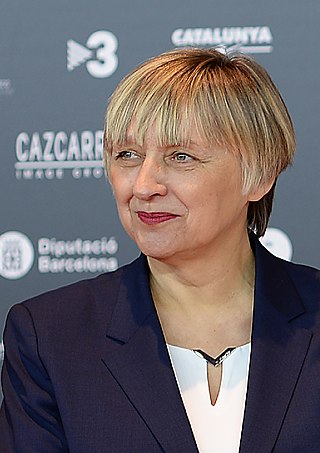
Ferdinand IV of Castile called the Summoned, was King of Castile and León from 1295 until his death.

Spanish literature generally refers to literature written in the Spanish language within the territory that presently constitutes the Kingdom of Spain. Its development coincides and frequently intersects with that of other literary traditions from regions within the same territory, particularly Catalan literature, Galician intersects as well with Latin, Jewish, and Arabic literary traditions of the Iberian peninsula. The literature of Spanish America is an important branch of Spanish literature, with its own particular characteristics dating back to the earliest years of Spain’s conquest of the Americas.

Rafael Alberti Merello was a Spanish poet, a member of the Generation of '27. He is considered one of the greatest literary figures of the so-called Silver Age of Spanish Literature, and he won numerous prizes and awards. He died aged 96. After the Spanish Civil War, he went into exile because of his Marxist beliefs. On his return to Spain after the death of Franco, he was named Hijo Predilecto de Andalucía in 1983 and Doctor Honoris Causa by the Universidad de Cádiz in 1985.

Severo Sarduy was a Cuban poet, author, playwright, and critic of Cuban literature and art. Some of his works deal explicitly with male homosexuality and transvestism.
The Novísimos - translated as the "Newest Ones" - were a poetic group in Spain who took their name from an anthology in which the Catalan critic Josep Maria Castellet gathered the work of the majority of the youngest and most experimental poets in the decade of the 1970s: Nueve novísimos poetas españoles, Barcelona, 1970. Nevertheless, they were often referred to as the "venecianos" (Venetians), in allusion to one of the poems in the anthology, Oda a Venecia ante el mar de los teatros by Pere Gimferrer.

Manuel María Arias Domínguez better known as Imanol Arias, is a Spanish actor and film director.

Ariadna Gil i Giner is a Spanish actress. She is known for her performances in films such as Belle Époque, Black Tears and Pan's Labyrinth.
The National Literature Prize for Narrative is a prize awarded by Spain's Ministry of Culture for a novel written by a Spanish author in any of the languages of Spain. The prize is 20,000 euros.

Fernando Díaz de Haro was a Spanish noble of the House of Haro. He was the second born son of Diego López V de Haro, the Lord of Biscay, and his wife, the infanta Violante de Castilla y Aragón, daughter of Alfonso X of Castile. Fernando became lord of Orduña and Balmaseda in 1322, after the death of his brother, Lope Díaz IV de Haro who died without leaving any descendants.
Maria of Portugal was a Portuguese royal, daughter of Infante Afonso of Portugal and his wife Violante Manuel.
A fondo was a Spanish television interview program hosted by Joaquín Soler Serrano that was broadcast on La Primera Cadena of Televisión Española from 1976 until 1981.

The Institución Libre de Enseñanza was a pedagogical experience developed in Spain for more than half a century (1876-1939). It was inspired by the Krausist philosophy introduced at the Central University of Madrid by Julián Sanz del Río, and had an important impact on Spanish intellectual life, as it carried out a fundamental work of renewal in Restoration Spain.

Margarita Carrera Molina was a Guatemalan philosopher, professor and writer. She was a member of the Academia Guatemalteca de la Lengua and the 1996 laureate of the Miguel Ángel Asturias National Prize in Literature.

Vicente Molina Foix is a Spanish writer and film director.
The Fisher of Songs is a 1954 Spanish musical comedy film directed by Antonio del Amo and starring Marujita Díaz, Tony Leblanc and Antonio Molina.

Leopoldo Alas Mínguez was a Spanish writer, poet and editor. He was the grand nephew of Leopoldo Alas "Clarin".

Daniel Garbade is a Spanish painter, illustrator, art director, property master and publisher. Born in Switzerland from Swiss-Cuban origins, Garbade is the grand-nephew of Adrien Lachenal, great-grandchild of Cuban sculptor Fernando Heydrich, grandson of Theodore Garbade and cousin of sculptor Juan Esnard Heydrich.

Teresa Font Guiteras is a Spanish film editor from Catalonia. She is a recurring collaborator in films directed by Imanol Uribe and Vicente Aranda.
The National Award for Literature in the Poetry Category has been presented annually by the Ministry of Culture of Spain since 1977.













